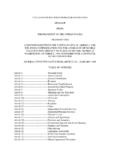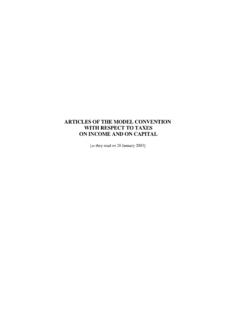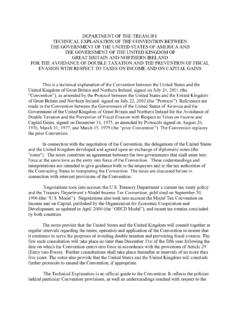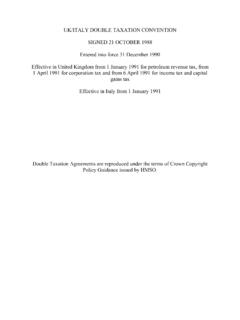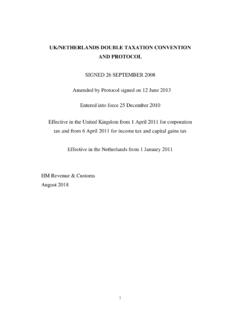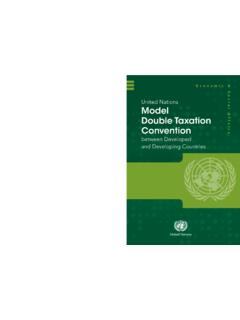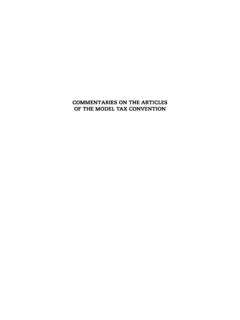Transcription of UNITED STATES - MEXICO INCOME TAX CONVENTION
1 UNITED STATES - MEXICO INCOME TAX CONVENTIONC onvention, with Protocol, Signed at Washington on September 18, 1992;Transmitted by the President of the UNITED STATES of America to the Senate on May 20, 1993(Treaty Doc. No. 103-7, 103d Cong., 1st Sess.);Reported favorably by the Senate Committee on Foreign Relations November 18, 1993 (S. No. 103-20, 103d Cong., 1st Sess.);Advice and Consent to Ratification by the Senate November 20, 1993, Given Subject to theFollowing Understandings:(a) That the phrase "both Contracting STATES shall apply that lower rate" inparagraph 8 (b) of the Protocol is understood to mean that both Contracting Statesagree to promptly amend the CONVENTION to incorporate that lower rate; and(b) That, while MEXICO imposes no excise tax on insurance premiums paid toforeign insurers and has no immediate plans to do so, should MEXICO enact such a tax inthe future, MEXICO will waive such tax on insurance premiums paid to insurers resident inthe UNITED Exchanged December 28, 1993, Confirming the Two Understandings Referred toAbove.
2 Entered into Force December 28, 1993; Effective January 1, 1994, for Most EFFECTIVE DATE UNDER ARTICLE 29: 1 JANUARY 1994 TABLE OF ARTICLESA rticle 1-----------------------------General ScopeArticle 2-----------------------------Taxes Covered by the ConventionArticle 3-----------------------------General Definitions:Article 4-----------------------------ResidenceA rticle 5-----------------------------Permanent EstablishmentArticle 6----------------------------- INCOME from Immovable Property (Real Property)Article 7-----------------------------Business ProfitsArticle 8-----------------------------Shipping and Air TransportArticle 9-----------------------------Associated EnterprisesArticle 10----------------------------DividendsA rticle 11----------------------------InterestAr ticle 11A--------------------------Branch TaxArticle 12----------------------------RoyaltiesA rticle 13----------------------------Capital GainsArticle 14---------------------------Independent Personal ServicesArticle 15-----------------------------Dependent Personal ServicesArticle 16----------------------------Directors FeesArticle 17----------------------------Limitation on BenefitsArticle
3 18----------------------------Artistes and AthletesArticle 19----------------------------Pensions, Annuities, Alimony, and Child SupportArticle 20----------------------------Government ServiceArticle 21----------------------------StudentsAr ticle 22----------------------------Exempt OrganizationsArticle 23----------------------------Other IncomeArticle 24----------------------------Relief from Double TaxationArticle 25----------------------------Non-Discri minationArticle 26----------------------------Mutual Agreement ProcedureArticle 27----------------------------Exchange of InformationArticle 28----------------------------Diplomatic Agents and Consular OfficersArticle 29----------------------------Entry into ForceArticle 30----------------------------Terminatio nLetter of Submittal-----------------of 11 May.
4 1993 Letter of Transmittal---------------of 20 May, 1993 Protocol 1----------------------------of 18 September, 1992 Protocol 2----------------------------of 8 September, 1994 Letter of Submittal (Protocol 2)--of 9 September, 1994 Letter of Transmittal (Protocol 2)-of 19 September, 1994 The Saving Clause ----------------Paragraph 3 of Article 1 MESSAGEFROMTHE PRESIDENT OF THE UNITED STSTAESTRANSMITTINGTHE CONVENTION BETWEEN THE GOVERNMENT OF THE UNITED STATES OFAMERICA AND THE GOVERNMENT OF THE UNITES MEXICAN STATES FOR THEAVOIDANCE OF DOUBLE TAXATION AND THE PREVENTION OF FISCAL EVASIONWITH RESPECT TO TAXES ON INCOME , TOGETHER WITH A RELATED PROTOCOL,SIGNED AT WASHINGTON ON SEPTEMBER 18, 1992 LETTER OF SUBMITTALDEPARTMENT OF STATE,Washington, May 11, PRESIDENT,The White House.
5 THE PRESIDENT: I have the honor to submit to you, with a view to its transmission to the Senatefor advice and consent to ratification, the CONVENTION Between the Government of the UNITED STATES ofAmerica and the Government of the UNITED Mexican STATES for the Avoidance of Double Taxation andthe Prevention of Fiscal Evasion with Respect to Taxes on INCOME , together with a related Protocol,signed at Washington on September 18, 1992. The CONVENTION contains provisions governing maximum rates of tax at source on payments ofdividends, interest and royalties. These provisions are generally favorable for investors in Mexicobecause they provide certainty and in most cases substantially reduce the tax cost of investing there.
6 Business profits in general are taxable in the other country only to the extent attributable to apermanent establishment there, and then only on a net basis with deductions for business expenses. Where the CONVENTION requires MEXICO to exempt or reduce its tax on Mexican INCOME of a , MEXICO also has agreed to provide relief from its assets tax when to impose the assets taxwould negate the benefits of the CONVENTION . The CONVENTION provides conditions under which each country may tax INCOME derived byindividual residents of the other country from independent personal services or as employees, as well aspension INCOME and social security benefits. Special relief is granted to visiting students, trainees, andresearchers.
7 Items of INCOME not specifically dealt with may be taxed only in the country of residence. The CONVENTION provides that MEXICO and the UNITED STATES will recognize each other's publiccharities on a reciprocal basis, with respect to both exempting the organizations from tax and to allowingtax deductions for contributions to such organizations, subject in the latter case to limitations to theincome arising in the other country. The benefits of the CONVENTION are limited to residents of the two countries meeting certainstandards designed to prevent residents of third countries from inappropriately using the standards are found in other recent UNITED STATES INCOME tax conventions. The Conventionseeks to assure that the country of residence will avoid double taxation of INCOME which arises in theother country and has been taxed there in accordance with the treaty's provisions.
8 In addition, the CONVENTION includes standard administrative provisions which will permit the taxauthorities of the two countries to cooperate to resolve issues of potential double taxation and toexchange information relevant to implementing the CONVENTION and the domestic laws imposing the taxescovered by the CONVENTION . The CONVENTION also includes non-discrimination provisions standards totreaties to avoid double taxation which apply to all taxes at all levels of government. The CONVENTION will enter into force on the date of the last notification that the constitutionalrequirements of each country have been satisfied. The provisions concerning taxes on dividends, interestand royalties will take effect on the first day of the second month following the date of entry into force ifthat occurs during the first six months of the calendar year, and otherwise, on the first day of thefollowing January.
9 Provisions concerning other taxes will take effect for taxable years beginning on orafter January 1 following the date of entry into force. A Protocol accompanies the CONVENTION and forms an integral part of it. It clarifies the operation ofcertain provisions and denies treaty benefits with respect to dividends and interest paid by certainUnited STATES investment companies. A technical memorandum explaining in detail the provisions of the CONVENTION will be prepared bythe Department of the Treasury and will be submitted separately to the Senate Committee on ForeignRelations. The Department of the Treasury and the Department of State cooperated in the negotiation of theConvention.
10 It has the full approval of both Departments. Respectfully submitted,WARREN CHRISTOPHER. Enclosures: As OF TRANSMITTALTHE WHITE HOUSE, May 20, the Senate of the UNITED STATES : I transmit herewith for Senate advice and consent to ratification the CONVENTION Between theGovernment of the UNITED STATES of America and the Government of the UNITED Mexican STATES for theAvoidance of Double Taxation and the Prevention of Fiscal Evasion with Respect to Taxes on INCOME ,together with a related Protocol, signed at Washington on September 18, 1992. Also transmitted for theinformation of the Senate is the report of the Department of State with respect to the CONVENTION . The INCOME tax CONVENTION , the first between the two countries, is intended to reduce the distortions(double taxation or excessive taxation) that can arise when two countries tax the same INCOME , therebyenabling UNITED STATES firms to compete on a more equitable basis in MEXICO and enhancing theattractiveness of the UNITED STATES to Mexican investors.










